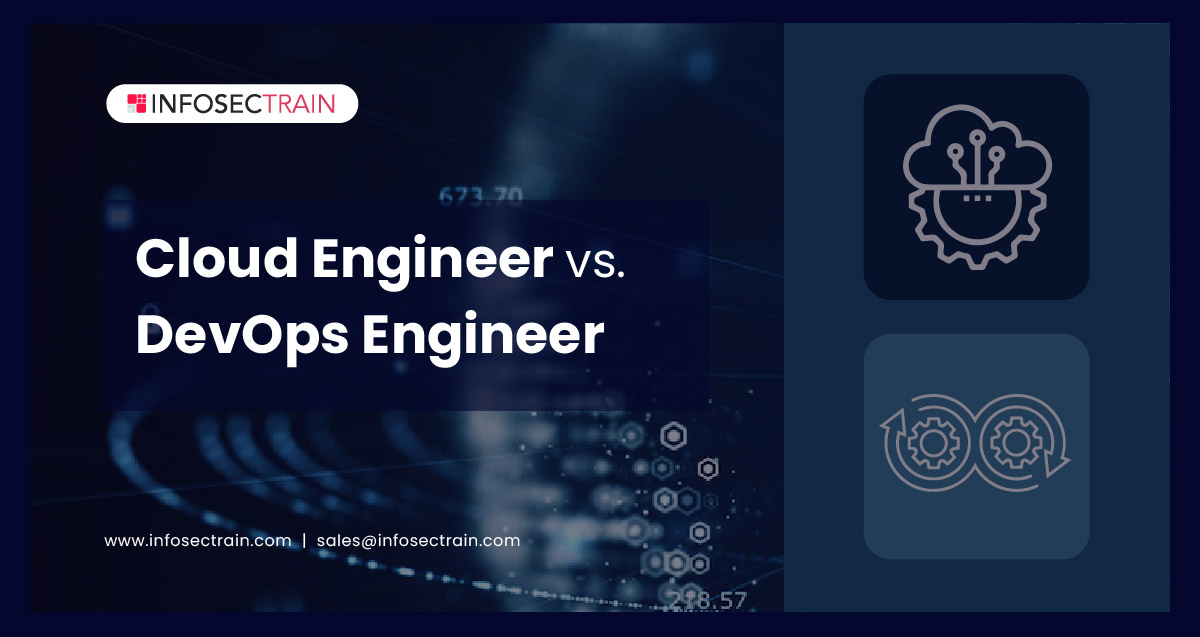Cloud Engineer vs. DevOps Engineer
This evolving world of information technology, whether related to the cloud or the developer industry, is showing significant progress. This innovation has also caused uncertainty among those looking to start a career in IT. That is to say, most people associate DevOps and Cloud. Yes, they are linked, but these two professions provide their world of chances, including the top-trending employment roles of Cloud Engineer and DevOps Engineer.
Table of Contents
Cloud Engineer vs. DevOps Engineer
Cloud Engineer
Job Roles of a Cloud Engineer
Job Responsibilities of a Cloud Engineer
Skills needed to become a Cloud Engineer
Salary of Cloud Engineer
DevOps Engineer
Job Roles of a DevOps Engineer
Job Responsibilities of a DevOps Engineer
Skills needed to become a DevOps Engineer
Salary of DevOps Engineer
Differences between Cloud Engineer and DevOps Engineer

Cloud Engineer vs. DevOps Engineer
Cloud Engineer
Cloud engineers creates remote networks that allow enterprises to exchange and transmit data, perform extensive data analysis, store backup data, and even test and develop apps. They create a cloud architecture that can support numerous users and manage massive amounts of data. The initial step for Cloud Engineers is to evaluate an organization’s business plan to develop a solution that fulfills its needs. They can interact with staff to discover more about system needs, such as how and by whom the cloud platform will be utilized. Collaboration across teams, including the Cloud platform, is essential to creating the solution.
Job Roles of a Cloud Engineer
- Cloud Developer
- Cloud Engineer
- Cloud Security Professional
- Network Engineer, Cloud, etc.
Job Responsibilities of a Cloud Engineer
Following are the job responsibilities of a Cloud Engineer:
- Developing cloud concepts and unique ideas through strategizing
- Managing sensitive data in the cloud
- Maintaining platform compatibility on various systems
- Creating and deploying cloud monitoring techniques
- Governing the cloud’s infrastructure
- Performance evaluation
Skills needed to become a Cloud Engineer
Consider the following skills if you want to develop and grow your career as a Cloud Engineer:
- Candidates first need to have a degree in computer science or a related subject.
- It is recommended that you have at least 3 years of expertise in cloud computing. In addition, advanced experience and understanding of CI/CD systems and SysOps are required.
- Candidates should have strong problem-solving and analytical capabilities, teamwork and communication skills, and client-handling abilities.
- Earning a Cloud Certification is the most significant approach for Cloud Engineers to advance their knowledge and abilities.
Salary of Cloud Engineer
According to Glassdoor, a Cloud Engineer’s total yearly compensation in the United States is expected to be $119,123, with an average salary of $104,039 each year.
DevOps Engineer
DevOps Engineers collaborate with development and operations teams to create stable and rapid software and update release pipelines. This primarily entails creating unique automation tools, integrating technologies, and enhancing process efficiency. This role involves bug monitoring in designs and the implementation of automation opportunities for engineers. Standard procedures are created to ensure standardization and efficiency in the production of products, in addition to the development and maintenance of configuration.
Job Roles of a DevOps Engineer
- Software Engineer
- Software Tester
- Software Developer
- Security Engineer
- Quality Assurance
- Automation Expert
Job Responsibilities of a DevOps Engineer
The following are the responsibilities of a DevOps Engineer:
- Explore possibilities for automation. Employing configuration tools such as Puppet and Chef
- Monitoring cloud security concerns
- Maintenance and deployment of web applications
- Application integration and testing and measuring application performance
Skills needed to become a DevOps Engineer
Some fundamental requirements must be met before taking on the profession of DevOps Engineer. Let’s find out more about them.
- Candidates must be graduates of a related subject, such as computer science or software engineering.
- It is suggested to have knowledge and experience of the software product life cycle, various automation tools, and software security techniques, using a wide range of programming languages, making decisions, working with others, and more.
- Earning a DevOps certification is the best way for DevOps Engineers to advance their knowledge and abilities.
Salary of DevOps Engineer
As per Glassdoor research, the average annual salary for a DevOps Engineer in the United States is $104,440, and the expected total pay for this position is $119,450.
Differences between Cloud Engineer and DevOps Engineer
Some of the differences between a Cloud Engineer and a DevOps Engineer include the following:
| Cloud Engineer | DevOps Engineer |
|
|
|
|
|
|
|
|
|
|
|
|
Be it Cloud Engineer or DevOps Engineer; people are game these days. It is hard to say which is better than the other because both are glamorous professions in their own domain. If you want to build a career in one of the two, you must prioritize your interest as both the Cloud Engineer and the DevOps Engineer have a huge career scope in the market.
About InfosecTrain
InfosecTrain is a well-known training organization. Join us for an exciting journey with our industry specialists if you desire a clear grip on the significant security courses. Our courses are available in both live instructor-led and self-paced formats, making it simple to start and finish your learning/training journey.




 1800-843-7890 (IN)
1800-843-7890 (IN) sales@infosectrain.com
sales@infosectrain.com
 1800-843-7890 (India)
1800-843-7890 (India) 
